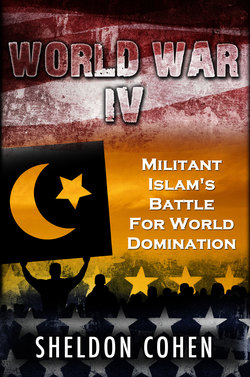Читать книгу World War IV: Militant Islam's Battle For World Domination - Sheldon J.D. Cohen - Страница 3
На сайте Литреса книга снята с продажи.
BACKGROUND HISTORICAL CONTRAST
ОглавлениеI AIM TO SET UP A THOUSAND-YEAR REICH AND ANYONE WHO SUPPORTS ME IN THIS BATTLE IS A FELLOW FIGHTER FOR A UNIQUE SPIRITUAL—I WOULD ALMOST SAY DIVINE—CREATION
Adolph Hitler
A divided United States of America was predominantly isolationist all through the 1930’s when Europe headed for war. Germany, under the leadership of Adolph Hitler, after bloodlessly conquering Austria and Czechoslovakia, invaded Poland on September I, 1939 unleashing World War II. America’s isolationist mind-set continued until December 7, 1941 when the Japanese attacked Pearl Harbor Naval Base in Hawaii, destroyed the bulk of the American Pacific fleet and killed over twenty-four-hundred of our sailors, soldiers and civilians. We now had the impetus to unite. The next day, President Roosevelt gave his famous “day that will go down in infamy” speech and declared war on Japan. Hitler, already at war with Britain, France, and allied with Japan, declared war on the United States forcing us to do what we do best in dangerous times; come together as one, mobilize human and industrial resources, pursue the war with vigor and emerge victorious three years and nine months later.
World War II had been a war between nations ending in the defeat of Germany and her allies in 1945. It morphed into a Cold War (some call it World War III), characterized as a state of tension between the Western Bloc consisting of the United States with the nations of the North Atlantic Treaty Organization (NATO) formed after World War II, and the Eastern Bloc consisting of Russia and its Allies of the Warsaw pact also set up after World War II. These former allies were now antagonists suspicious of each other’s motives and engaged in a psychological war pitting nations against nations, both sides armed with nuclear weapons.
The Cold War was not a shooting war, but the resulting tensions did provoke conflict between nations or groups of nations, such as the Korean War (1950-1953), the Viet Nam War (1959-1975), and the Soviet war in Afghanistan (1979-1989). The Cold War also did provoke incidents that could have led to war such as The Berlin Blockade crisis (1948-1949), the Berlin Crisis of 1961 and the Cuban Missile Crisis (1962).
Now, 2013, we are engaged in a war—not nation against nation—but against a radical religious segment of a religion, which threatens to destroy our civilization.
